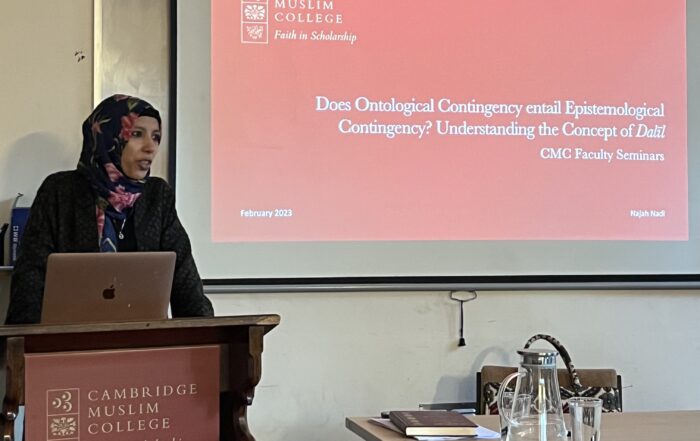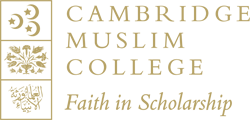In this seminar, Dr Najah Nadi (Cambridge Muslim College Lecturer) addresses the compatibility of Sunni occasionalism with classical foundationalism within Muslim theological traditions. She explores this question within three bodies of knowledge: (1) discussions pertaining to the nature of being, or ontology; (2) the theological doctrines pertaining to the Divine Attributes; and, (3) the theoretical frameworks of knowledge, or epistemology. She concludes that while Sunni classical scholars upheld Divine Omnipotence, they neither negate human agency, nor our capacity to know things as they are in the universe and in revelation.

Classical and late Classical Occasionalism: The Ashʿarīs and Māturīdīs
The two Sunni theological schools, the Ashʿarīs and Māturīdīs, centre God’s absolute power in a way that negates any kind of natural causality and makes every contingent being completely dependent on the Necessary Existent. Natural causes are in reality occasions for God to bring about effects, hence the term occasionalism. They define causal relationships through the conventional Divine habit in opposition to other theological schools, such as the Muʿtazila and the ancient philosophers who insist that causal relationships are natural necessities (i.e., causes naturally necessitate effects). Yet, in the new late classical works of these two groups, the Sunni theologian-philosophers confirmed the necessity of such causal power based upon the deduction of human reason and not a natural proposition. In both scenarios, the separation between causes and effects is impossible. For instance, in Ismāʿīl Gelenbevī’s (d. 1205/1791) understanding, there is a rational entailment (luzūm ʿaqlī) between some of God’s actions, which also applies to the realm of the science of ‘knowing’ where premises and conclusions cannot be separated.
Classical and late Classical Foundationalism
As Najm al-Dīn ʿAlī bin ʿUmar al-Kātībī (d. 675/1277) highlights, classical Islamic foundationalism is based upon two fundamental premises concerning knowledge: some knowledge is inherently known whilst some is acquired through speculative inquiry (naẓar). This confirms both that everything has a reality, and that these realities are knowable to the human intellect. Furthermore, as al-Sayyid al-Sharīf al-Jurjānī (d. 816/1413) explains, the latter premise is dependent upon a definitive set of conceptions and assents, that is, necessary knowledge. The consequent speculative knowledge obtained will then be adopted as a proof (dalīl) or a way to further knowledge. Such proof is thus the cause of the conclusion, while inquiry is its prerequisite condition. Once again, the late classical scholars, such as ʿAbd al-Raḥmān al-Pinjwīnī (d. 1319/1900), emphasise that a necessary entailment between proofs and conclusions does not negate the core theological principles mentioned above.
Dr Nadi has thus shown that the classical foundationalist approach to knowledge guided scholarly discussions pertaining to core theological doctrines. This resulted in fruitful developments in the classical occasionalist approach which, nonetheless, remained faithful to the core theological principles of divine omnipotence.
The seminar concluded with a rich discussion where participants raised important questions pertaining to miracles, the pre-eternality of the effect (dalīl) of Divine Knowledge, and which aspect of the Divine Nature defines the possibility or necessity of a certain cause, thus introducing and stimulating further areas of research and investigation.
For more information about the Cambridge Muslim College Research Seminar, see here.
 Dr. Najah Nadi is a traditionally trained academic with over two decades of learning experiences and over a decade of teaching experience. Her research focuses on Islamic classical theories of knowledge across disciplines of philosophy, theology, law, and spirituality, as well as fatwas and fatwa institutions. Dr. Najah holds a D.Phil. from the University of Oxford, focusing on the scholarship of the immanent Persian polymath Saʿd al-Dīn al-Taftāzānī (d. 792/1390). She also holds an M.A. in Religious and Theological Studies from Boston University, as well as a B.A. in Islamic Studies from al-Azhar University in Cairo. Dr. Najah has completed several years of traditional training at al-Azhar Mosque, receiving teaching licenses (ijāzāt) in various Islamic sciences. Dr. Najah has served as a junior fellow at the Holberg seminar on Islamic history at Princeton University from 2015-2019, a fellow of peace and reconciliation at Virginia Theological Seminary from 2017-2021. Her teaching courses include Islamic legal theories, classical logic and ontology and Islamic spirituality and ethics.
Dr. Najah Nadi is a traditionally trained academic with over two decades of learning experiences and over a decade of teaching experience. Her research focuses on Islamic classical theories of knowledge across disciplines of philosophy, theology, law, and spirituality, as well as fatwas and fatwa institutions. Dr. Najah holds a D.Phil. from the University of Oxford, focusing on the scholarship of the immanent Persian polymath Saʿd al-Dīn al-Taftāzānī (d. 792/1390). She also holds an M.A. in Religious and Theological Studies from Boston University, as well as a B.A. in Islamic Studies from al-Azhar University in Cairo. Dr. Najah has completed several years of traditional training at al-Azhar Mosque, receiving teaching licenses (ijāzāt) in various Islamic sciences. Dr. Najah has served as a junior fellow at the Holberg seminar on Islamic history at Princeton University from 2015-2019, a fellow of peace and reconciliation at Virginia Theological Seminary from 2017-2021. Her teaching courses include Islamic legal theories, classical logic and ontology and Islamic spirituality and ethics.

